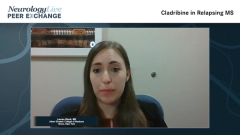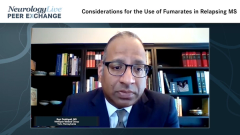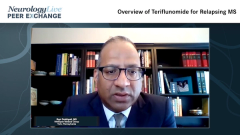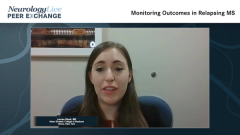
Overview of Teriflunomide for Relapsing MS
Lauren Gluck, MD, and Ravi Dukkipati, MD, provide an overview of teriflunomide for relapsing multiple sclerosis including its safety and tolerability profile.
Episodes in this series

Fred D. Lublin, MD: Let’s move along. The next agent I want to briefly discuss is teriflunomide, which a little like cladribine, is relatively selective for lymphocytes. Lauren?
Lauren Gluck, MD: Yes, on the topic of low-moderate efficacy agents that are safe, teriflunomide is there. It’s a pyrimidine synthesis inhibitor. It’s selective against lymphocytes, so the initial few months on treatment require monthly laboratory monitoring to look for lymphopenia and transaminitis. But beyond that, things flow very smoothly. Lab monitoring is once every 6 months. For patients, it’s very easy to be on teriflunomide. It’s 1 pill a day and has very few [adverse] effects. Statistically, people may have headaches or sore throat, but the one thing that gets a lot of my patients is hair thinning. If people experience hair thinning, it’s usually 1 to 3 months down the line from starting the medicine. It should last only 1 hair follicle cycle, but I have a lot of patients who either experience a lot of hair loss beyond that, or subjectively, get very upset about the concept of hair thinning and want to get off of the medicine, or may not want to start the medicine. This medicine can stay in your system for up to 8 or 9 months if you metabolize it in a specific way.
One unique thing about this medicine is that there is a rapid elimination protocol, where people can take activated charcoal or cholestyramine for 11 to 14 days. There’s a lab test to check if the metabolite is still in the system, and oftentimes, it’s not. However, even though there is this washout period, this isn’t a medicine I prescribe for women of childbearing age. It has substantial teratogenicity potential. It previously held a black box warning, in the category X rating for teratogenicity. I think that has been modified slightly, but it is still a big concern, especially with how long this medicine can stay in some people’s bodies. So for women, even those who say, “I’m using a barrier contraception, or I’m using oral contraception,” if there’s a risk that contraception may not work, this is probably not a drug you want to give because you don’t want anyone to stay up at night worrying, or for you to worry as well. It’s also one of the only DMTs [disease-modifying therapies] that’s hasn’t had a case of PML [progressive multifocal leukoencephalopathy]. That is a big point toward its safety. Teriflunomide has high safety and low-moderate effectiveness, but it’s good for the patient who may need something stronger than the “platform therapies.” This is the drug for people unwilling to take on risk and who don’t want to inject themselves.
Fred D. Lublin, MD: Ravi, thoughts in the community?
Ravi Dukkipati, MD: That was very well summarized. I think teriflunomide has a limited role these days, at least in my practice, WellSpan Medical Group in York, Pennsylvania. It offers modest efficacy and is reasonably well tolerated, but there are better options. I would argue that there are better options in, for example, the chronic, stable patient in whom we may be considering neurosenescence. Cladribine, for example, might be one option where there would be an exit strategy of sorts, and the patient doesn’t need to continue on it indefinitely. The other point is that there’s a reason why teriflunomide is increasingly being used as the active comparator in clinical trials. I think it’s by virtue of its relatively lower efficacy compared to some of the newer higher efficacy agents. Lauren, to your point regarding PML, I believe cladribine hasn’t been associated with PML in the treatment of MS [multiple sclerosis] worldwide. But you’re right, teriflunomide carries that distinction as well.
Fred D. Lublin, MD: I must say, in our hands, we have found [teriflunomide] to be safe and reasonably effective. We’ve been pretty happy with it. Gavin, any PML with cladribine?
Gavin Giovannoni, MD: Cladribine was licensed for CLL [chronic lymphocytic leukemia].
Fred D. Lublin, MD: No, I meant in MS.
Gavin Giovannoni, MD: No, I’m not aware of any but there will be carry-over cases. There’s no doubt that when you move high-risk patients from natalizumab and it happens to be cladribine, I suspect that we will, but I don’t think it’ll be due to cladribine. The reason I’m saying that is because you have immune reconstitution, and you’ll have normal immune surveillance within the central nervous system and the periphery. I think what Lauren was pointing out, there’s big literature about leflunomide, which is the pro-drug, and teriflunomide being antiviral and suppressing the BK virus, which is the first cousin of the JC [John Cunningham] virus. They use leflunomide in BK virus nephropathy. So I think you’re probably not going to get a PML risk with teriflunomide because it’s preventing the replication of the virus. That’s my hypothesis.
Fred D. Lublin, MD: Interesting, the whole idea of the antiviral activity in those types of agents needs to be explored further. That’s an interesting point. I’m glad you brought it up.
Gavin Giovannoni, MD: I think teriflunomide may be the drug of choice to derisk anti-CD20 [monoclonal antibodies]. I’ve said this for a while: induce the patient, get the disease under control with an anti-CD20, and then give the patient teriflunomide for maintenance because teriflunomide is safe in terms of its profile.
Fred D. Lublin, MD: Thank you all for watching this NeurologyLive® Peer Exchange. If you enjoyed the content, please subscribe to our e-newsletters to receive upcoming Peer Exchanges and other great content right in your inbox. Thank you for joining us.
Transcript Edited for Clarity
Newsletter
Keep your finger on the pulse of neurology—subscribe to NeurologyLive for expert interviews, new data, and breakthrough treatment updates.
























